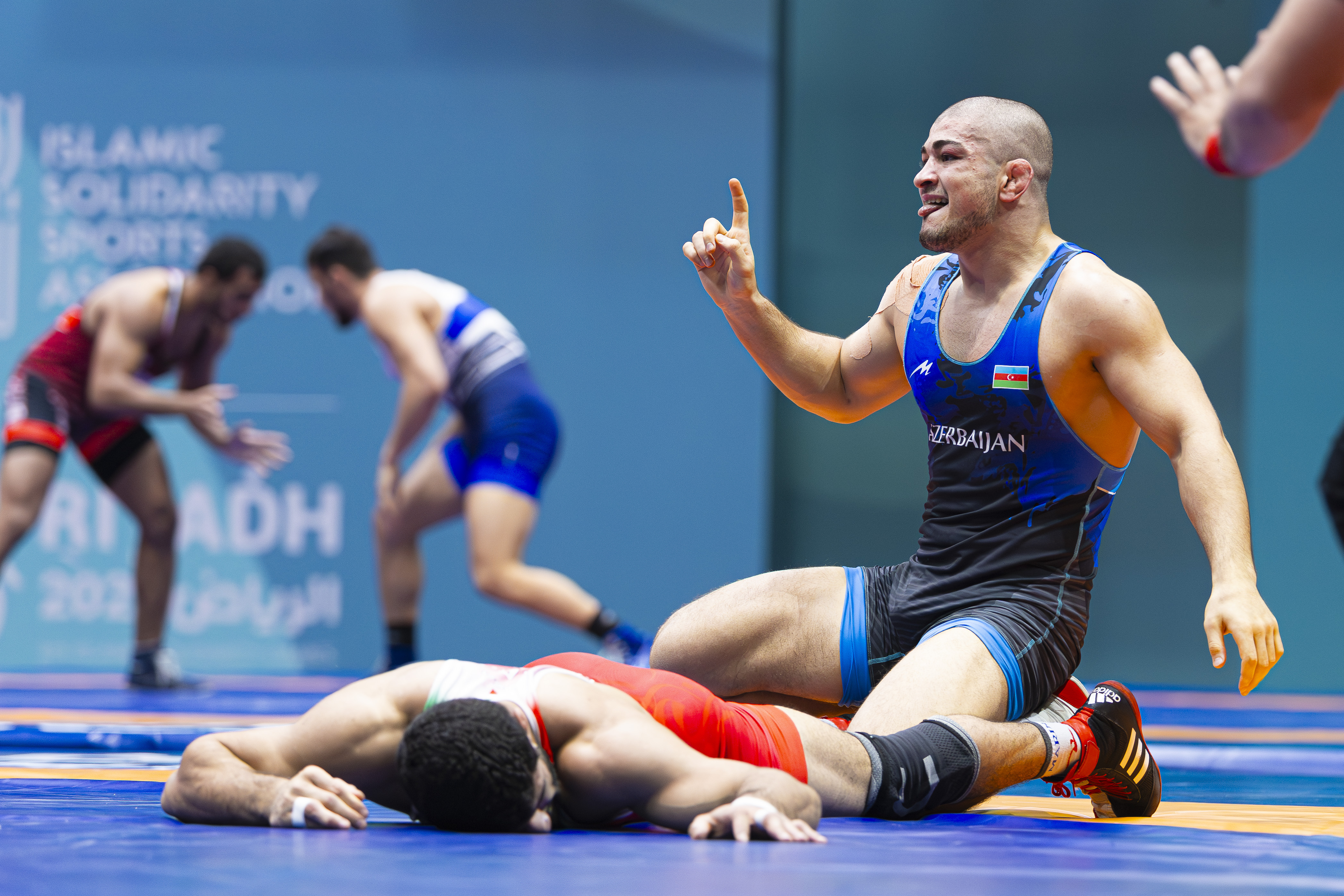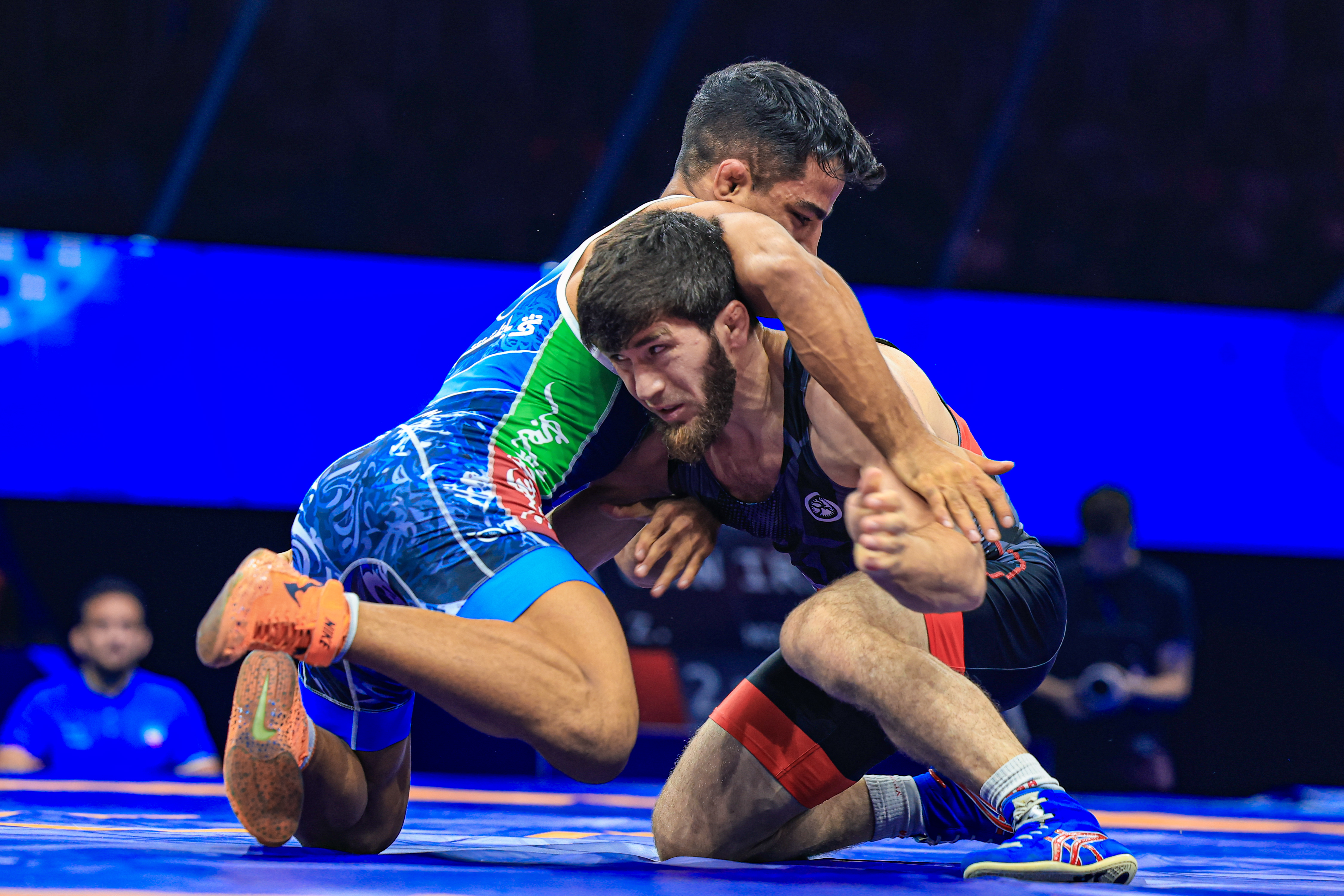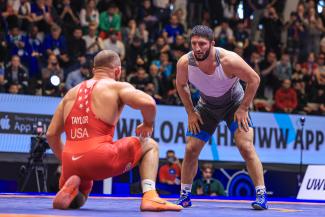Wrestling at the Muhamet Malo Ranking Series event in Tirana, Albania, Sadulaev will join Snyder, Magomedkhan MAGOMEDOV (AZE), Rizabek AITMUKHAN (KAZ), Batyrbek TSUKALOV (SVK), Mukhamed KHANIEV (UWW), among others. If Sadulaev and Snyder clash, it will be their first match since the 2021 World Championships final in Oslo, Norway.
Snyder is still the rock he is, pressuring wrestlers into giving up at his pace. It is how he won his fourth world title in Zagreb. He easily overpowers everyone except Sadulaev.
But will Sadulaev be at his best? The 29-year-old last competed at the 2024 Non-Olympic World Championships, winning gold at 92kg after that epic semifinal against Kamran GHASEMPOUR (IRI). From his social media, Sadulaev seems to be in shape, sharing videos of his training from the gym, mat and even outdoors. He also had an interesting training session with Greco-Roman Olympic champion Musa EVLOEV (UWW), who has now decided to skip the event after initially registering.
The challengers will definitely have their chances in Tirana. Aitmukhan leads the pack, spurred by his victory over Tazhudinov at the Islamic Solidarity Games 2025 in October. The 2023 world champion at 92kg has slowly improved and was fifth at the World Championships.
Olympic bronze medalist Magomedov will be another threat but his struggles with conditioning are evident from past tournaments. Khaniev, a 92kg silver medalist at U23 World Championships, is another exciting talent making his debut at 97kg. With veterans in the mix, Khaniev has to find a way to move past them.
 Arsenii DZHIOEV (AZE) defeated Kamran GHASEMPOUR (IR) at 86kg at the ISG 2025. (Photo: United World Wrestling / Kadir Caliskan)
Arsenii DZHIOEV (AZE) defeated Kamran GHASEMPOUR (IR) at 86kg at the ISG 2025. (Photo: United World Wrestling / Kadir Caliskan)
A few other weight classes will see match-ups that may or may not occur again.
World bronze medalist Arsenii DZHIOEV (AZE) starts his 2026 season at 86kg. He defeated Ghasempour for a tactical victory at the ISG 2025 in Riyadh. At the World Championships, he dropped his quarterfinal to Hayato ISHIGURO (JPN), 13-8, before returning to win the bronze medal.
Dzhioev will be wary of two wrestlers in particular -- Kyle DAKE (USA) and Ibragim KADIEV (UWW). Dake, a world champion at both 74kg and 79kg, will make his first international appearance at 86kg and first since the 2024 Paris Olympics. Dake, who will turn 35 on February 25, is still adjusting to the new weight and Tirana will be a huge test.
Kadiev, a former U20 world champion, lost a close bout to Ghasempour at the World Championships but has what it takes to go all the way in Tirana.
Earlier in February, former world silver medalist at 79kg Vladimeri GAMKRELIDZE (GEO) impressed with a silver medal performance in Zagreb. The same was not true for 79kg world champion Georgios KOUGIOUMTSIDIS (GRE) who made his 86kg debut. Both will return at 86kg in Tirana. Another wrestler moving up is Alp Arslan BEGENJOV (TKM), a former U20 world champion at 79kg. Veteran of this weight, Osman GOCEN (TUR), would like to disrupt the order as well.
 Zavur UGUEV (UWW), world champion at 61kg, is the favorite in Tirana. (Photo: United World Wrestling / Amirreza Aliasgari)
Zavur UGUEV (UWW), world champion at 61kg, is the favorite in Tirana. (Photo: United World Wrestling / Amirreza Aliasgari)
World champion Zavur UGUEV (UWW) will be at 61kg and the favorite despite the presence of Zelimkhan ABAKAROV (ALB) and world bronze medalist Gulomjon ABDULLAEV (UZB).
Bekzat ALMAZ UULU (KGZ), world silver medalist from 57kg, will also try his hand at 61kg. Zagreb Open gold medalist Austin DESANTO (USA) is also among the names at 61kg.
Former 61kg world champion Vitali ARUJAU (USA) is moving to 65kg. He is expected to have a challenging field though. World bronze medalist Umidjon JALOLOV (UZB) will be the biggest threat as he begins the new season. U23 world champion and Zagreb Open champion SUJEET (IND) has also entered the second straight Ranking Series event.
U23 world bronze medalist Bilol SHARIP UULU (KGZ), who lost the semifinals to Jalolov, world fifth-placer Peiman BIABANI (CAN), and former U20 world champion Mohit KUMAR (IND) are also part of the weight class.
European champion at 65kg Ibragim IBRAGIMOV (UWW) will be wrestling at 70kg in Tirana. He had a rather underwhelming World Championships, losing the bronze medal bout to Jalolov. In Tirana, he will be checked by Asian champion Ernazar AKMATALIEV (KGZ), who was once the most versatile wrestler but has faded a little recently.
Austin GOMEZ (MEX) and Islam DUDAEV (ALB) are also at 70kg and the former can run through the field on his day.
Azerbaijan will have a domestic battle at 74kg as Turan BAYRAMOV (AZE) will be challenged by 70kg U23 world champion Kanan HEYBATOV (AZE). The jump to 74kg from Heybatov sets up an intense battle in Azerbaijan as both eye the spot on the European and World Championships teams later. However, the weight difference may give Bayramov the edge.
But both also have to face competition from former world medalist Yones EMAMI (IRI), Asian silver medalist Orozobek TOKTOMAMBETOV (KGZ), and Inalbek SHERIEV (UWW), a 2024 world bronze medalist at 70kg.
Iran will hope that Amirhossein FIROUZPOUR (IRI), one of their choices at 92kg, returns with a gold medal, just like Mobin AZIMI (IRI) did at the Zagreb Open. Azimi, however, lost his Nelson bracket bout to world champion Trent HIDLAY (USA) before the American forfeited the final.
The 125kg weight class will throw a few battles. World silver medalist Giorgi MESHVILDISHVILI (AZE) will be the favorite in a field that also has Mason PARRIS (USA), Wyatt HENDRICKSON (USA), Khasanboy RAKHIMOV (UZB), and Abdulla KURBANOV (UWW).
Freestyle action will kick off the Muhamet Malo Ranking Series 2026 on February 25 in Tirana on UWW+. Click here for full schedule. Click here for Mumahet Malo 2026 entries.



 Arsenii DZHIOEV (AZE) defeated Kamran GHASEMPOUR (IR) at 86kg at the ISG 2025. (Photo: United World Wrestling / Kadir Caliskan)
Arsenii DZHIOEV (AZE) defeated Kamran GHASEMPOUR (IR) at 86kg at the ISG 2025. (Photo: United World Wrestling / Kadir Caliskan) Zavur UGUEV (UWW), world champion at 61kg, is the favorite in Tirana. (Photo: United World Wrestling / Amirreza Aliasgari)
Zavur UGUEV (UWW), world champion at 61kg, is the favorite in Tirana. (Photo: United World Wrestling / Amirreza Aliasgari)
Share your thoughts.
Comments